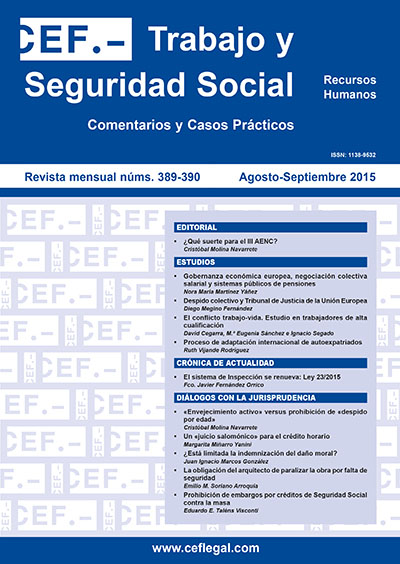The interference of the European economic governance in the wages collective bargaining and public pension systems
DOI:
https://doi.org/10.51302/rtss.2015.2688Keywords:
European economic governance, wages, pensions, collective bargaining, social policyAbstract
The EU economic governance has achieved, in recent years, an unprecedented development, becoming a voracious superstructure that unfolds more and more intense and expansive, powers through which it has been able to absorb regulatory processes that few years ago were developed independently in other contexts and by other actors –coordination of employment policies, social policies, pensions, collective bargaining of wage determination, etc.–. The occupation of outside competence areas generates significant collisions within the legal system of the Union, but also between it and the legal systems of the Member States. This paper aims to examine the instruments the EU uses to intervene in wage policies and pension systems of the Member States and to evaluate its ability to impact through the analysis of its implementation mechanisms. The knowledge of the political tendencies that are imposed through the European Semester not only allows to contextualize and better understand the reforms carried out in Spain, but also glimpse other reforms that sooner or later will be implemented.
Downloads
References
Aibar Bernard, J. [2014]: «¿Qué se puede exigir a la Seguridad Social en época de crisis y cómo se puede favorecer su sostenibilidad económica, política y social?», RTSS.CEF, pág. 375.
Ashiagbor, D. [2013]: «Unravelling the embedded liberal bargain: Labour and social welfare law in the context of EU market integration», European Law Journal, vol. 19, núm. 3.
Arnull, A.; Dashwood, A.; Dougan, M.; Ross, M.; Spaventa, E. y Wyatt, D. [2006]: Wyatt & Dashwood's European Union Law, 5.ª ed., London: Thomson - Sweet & Maxwell.
Barnard, C. [2014]: «Article 28 - Right of collective bargaining and action», en Peers, S., Hervey, T.; Kenner, J. y Ward, A. (eds.), The EU charter of fundamental rights. A commentary, Oxford and Portland: Hart Publishing.
Bekker, S. y Klosse, S. [2014]: «The changing legal context of employment policy coordination», European Labour Law Journal, núm. 5, pág. 1.
Bieber, R. [2014]: «The allocation of economic policy competences in the European Union», en Azoulai, L. (ed.), The question of competence in the European Union, Oxford University Press.
Bruun, N.; Lörcher, K. y Schömann, I. (eds.) [2014]: The economic and financial crisis and collective labour law in Europe, Oxford and Portland: Hart publishing.
Craig, P. y De Búrca, G. [2011]: EU Law. Text, cases and materials, 5.ª ed., Oxford University Press.
De la Parra, S. [2013]: «The two pack on economic governance: An initial analysis», Background Analysis - ETUI, núm. 3.
Gala Durán, C. [2014]: «Un nuevo modelo de pensión de jubilación: El impacto del índice de revalorización anual y del factor de sostenibilidad», IUSLabor, núm. 1.
García-Perrote Escartín, I. y Mercader Uguina, J. R. [2014]: «Cláusulas de revisión salarial no ligadas al índice de precios al consumo: Nuevos rumbos de la negociación colectiva», Información Laboral, núm. 2.
Gómez Rufián, L. [2014]: «Moderación salarial, devaluación interna y nuevas tendencias retributivas desde 2012», Revista de Información Laboral, núm. 10.
González Ortega, S. [2014]: «El nuevo régimen de revalorización de las pensiones», Relaciones Laborales. Revista Crítica de Teoría y Práctica, núm. 5.
Hancké, B. [2012]: «Worlds apart? Labour unions, wages and monetary integration in Continental Europe», Reihe Politikwissenschaft - Political Science Series [Institut für Höhere Studien (IHS), Wien - Institute for Advanced Studies, Vienna], núm. 128.
Hinarejos, A. [2014]: «Economic and monetary Union», en Barnard, C. y Peers, S. (eds.), European Union Law, Oxford University Press.
Hodson , D. y Maher, I. [2004]: «Soft law and sanctions: Economic policy co-ordination and reform of the Stability and Growth Pact», Journal of European Public Policy, vol. 11, núm. 5, octubre.
Johnston, A. y Hancké, B. [2009]: «Wage inflation and labour unions in EMU», Journal of European Public Policy, núm. 16, págs. 4.
López Ahumada, J. E. [2014]: «Las cláusulas de inaplicación salarial dirigidas a la adaptación y negociación de los salarios en la empresa: El ajuste flexible de los salarios a debate», Relaciones Laborales. Revista Crítica de Teoría y Práctica, núm. 6.
López Gandía, J. [2014]: «La dimensión constitucional de la reforma de las pensiones», Relaciones Laborales. Revista Crítica de Teoría y Práctica, núm. 5.
Lörcher, K. [2012]: «Social competences», en Bruun, N.; Lörcher, K. y Schömann, I. (eds.), The Lisbon Treaty and Social Europe, Oxford and Portland: Hart Publishing.
Natali, D. y De la Porte, C. [2009]: «Participation through the Lisbon strategy: Comparing the European Employment Strategy and pensions OMC», Transfer. European Review of Labour and Research , vol. 15, núm. 1.
Olesti Rayo, A. [2013]: «La evolución del Pacto de Estabilidad y Crecimiento», en Olesti Rayo, A. (coord.), Crisis y coordinación de políticas económicas en la Unión Europea, Madrid-Barcelona: Marcial Pons.
Palmstorfer, R. [2014]: «The reverse majority voting under the "six pack": A bad turn for the Union?», European Law Journal, vol. 20, núm. 2.
Rodríguez-Piñero y Bravo-Ferrer, M. y Casas Baamonde, M. E. [2014]: «El factor de sostenibilidad de las pensiones de jubilación y la garantía de la suficiencia económica de los ciudadanos durante la tercera edad», Relaciones Laborales. Revista Crítica de Teoría y Práctica, núm. 5.
Schulten, T. y Müller, T. [2013]: «A new European Interventionism? The impact of the new European economic governance on wages and collective bargaining», en Natali, D. y Vanhercke, B. (eds.), Social developments in the European Union 2012. Fourteenth annual report, Bruselas: ETUI.
Seifert, A. [2014]: «European economic governance and the labor laws of the EU Member States», Comparative Labor Law & Policy Journal, núm. 35, pág. 3.
Snyder, F. [2011]: «EMU - Integration and differentiation: Metaphor for European Union», en Craig, P. y De Búrca, G. (eds.), The Evolution of EU Law, 2.ª ed., Oxford University Press.
Terpan, F. [2015]: «Soft law in the European Union - The changing nature of EU law», European Law Journal, vol. 21, núm. 1.



















